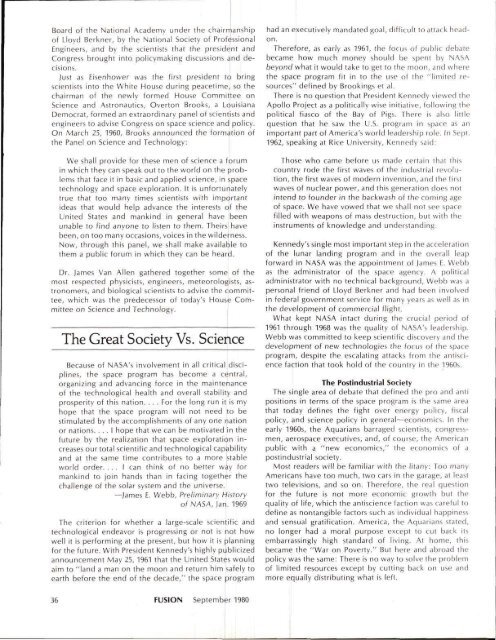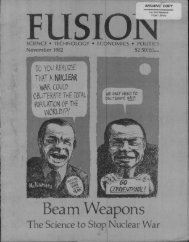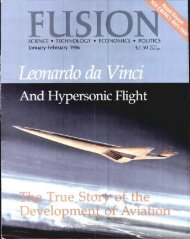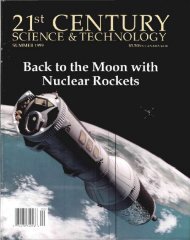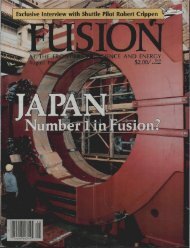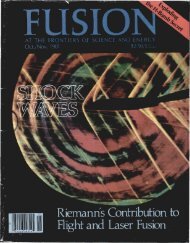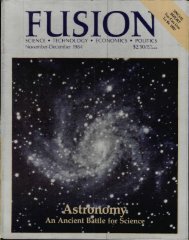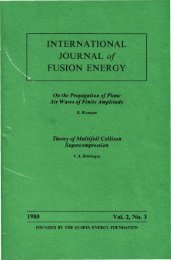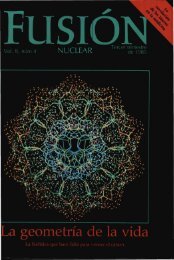fusion energy foundation
fusion energy foundation
fusion energy foundation
- No tags were found...
Create successful ePaper yourself
Turn your PDF publications into a flip-book with our unique Google optimized e-Paper software.
Board of the National Academy under the chairmanshipof Lloyd Berkner, by the National Society of ProfessionalEngineers, and by the scientists that the president andCongress brought into policymaking discussions aW decisions.Just as Eisenhower was the first president to bringscientists into the White House during peacetime, so thechairman of the newly formed House Committee onScience and Astronautics, Overton Brooks, a LouisianaDemocrat, formed an extraordinary panel of scientists andengineers to advise Congress on space science and policy.On March 25, 1960, Brooks announced the formation ofthe Panel on Science and Technology:We shall provide for these men of science a forumin which they can speak out to the world on the problemsthat face it in basic and applied science, in spacetechnology and space exploration. It is unfortunatelytrue that too many times scientists with importantideas that would help advance the interests of theUnited States and mankind in general have beenunable to find anyone to listen to them. Theirs! havebeen, on too many occasions, voices in the wilderness.Now, through this panel, we shall make available tothem a public forum in which they can be heard.Dr. James Van Allen gathered together some! of themost respected physicists, engineers, meteorologists, astronomers,and biological scientists to advise the committee,which was the predecessor of today's House Committeeon Science and Technology.The Great Society Vs. ScienceBecause of NASA's involvement in all critical disciplines,the space program has become a central,organizing and advancing force in the maintenanceof the technological health and overall stability andprosperity of this nation. . . . For the long run it is myhope that the space program will not need to bestimulated by the accomplishments of any one nationor nations. ... I hope that we can be motivated in thefuture by the realization that space exploration increasesour total scientific and technological capabilityand at the same time contributes to a more 'stableworld order. ... I can think of no better way formankind to join hands than in facing together thechallenge of the solar system and the universe.—James E. Webb, Preliminary Historyof NASA, Jari. 1969The criterion for whether a large-scale scientific andtechnological endeavor is progressing or not is hot howwell it is performing at the present, but how it is planningfor the future. With President Kennedy's highly publicizedannouncement May 25,1961 that the United States wouldaim to "land a man on the moon and return him safely toearth before the end of the decade," the space programhad an executively mandated goal, difficult to attack headon.Therefore, as early as 1961, the focus of public debatebecame how much money should be spent by NASAbeyond what it would take to get to the moon, and wherethe space program fit in to the use of the "limited resources"defined by Brookings et al.There is no question that President Kennedy viewed theApollo Project as a politically wise initiative, following thepolitical fiasco of the Bay of Pigs. There is also littlequestion that he saw the U.S. program in space as animportant part of America's world leadership role. In Sept.1962, speaking at Rice University, Kennedy said:Those who came before us made certain that thiscountry rode the first waves of the industrial revolution,the first waves of modern invention, and the firstwaves of nuclear power, and this generation does notintend to founder in the backwash of the coming ageof space. We have vowed that we shall not see spacefilled with weapons of mass destruction, but with theinstruments of knowledge and understanding.Kennedy's single most important step in the accelerationof the lunar landing program and in the overall leapforward in NASA was the appointment of James E. Webbas the administrator of the space agency. A politicaladministrator with no technical background, Webb was apersonal friend of Lloyd Berkner and had been involvedin federal government service for many years as well as inthe development of commercial flight.What kept NASA intact during the crucial period of1961 through 1968 was the quality of NASA's leadership.Webb was committed to keep scientific discovery and thedevelopment of new technologies the focus of the spaceprogram, despite the escalating attacks from the antisciencefaction that took hold of the country in the 1960s.The Postindustrial SocietyThe single area of debate that defined the pro and antipositions in terms of the space program is the same areathat today defines the fight over <strong>energy</strong> policy, fiscalpolicy, and science policy in general—economics. In theearly 1960s, the Aquarians barraged scientists, congressmen,aerospace executives, and, of course, the Americanpublic with a "new economics," the economics of apostindustrial society.Most readers will be familiar with the litany: Too manyAmericans have too much, two cars in the garage, at leasttwo televisions, and so on. Therefore, the real questionfor the future is not more economic growth but thequality of life, which the antiscience faction was careful todefine as nontangible factors such as individual happinessand sensual gratification. America, the Aquarians stated,no longer had a moral purpose except to cut back itsembarrassingly high standard of living. At home, thisbecame the "War on Poverty." But here and abroad thepolicy was the same: There is no way to solve the problemof limited resources except by cutting back on use andmore equally distributing what is left.36 FUSION September 1980


